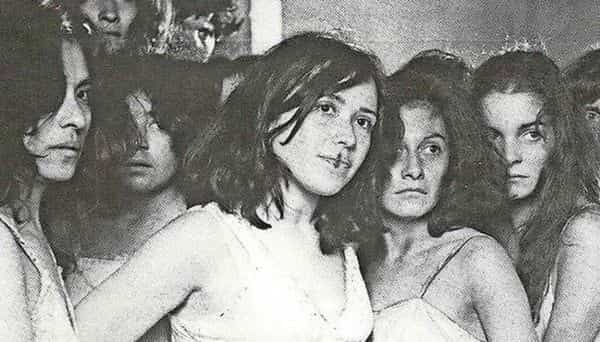The four Valenzuela sisters, a story of terror and horror

In 1945, Mexico faced a harsh reality: prostitution was considered a respectable business. Four sisters, known as the Valenzuela sisters, saw an opportunity.
They had little education and no special skills but were full of ambition. They wanted to make money and live better lives. With few options available, they opened a brothel.
The Opening of Rancho El Ángel
The sisters named their brothel “Rancho El Ángel.” This was a place where men paid for time with women. However, the sisters themselves were not popular with the customers because of their looks. They realized they needed other women to attract business.
To find workers, they placed ads in local newspapers. These ads said they were hiring young women to work as maids. The job promised free room, meals, and good pay. Many women, hoping for a better future, applied.
But once they arrived, they discovered a nightmare. There was no real job. Instead, they were forced to become sex slaves. They couldn’t leave, and they never received any pay.
Expansion Through Kidnapping
Even though their business made good money, the Valenzuela sisters wanted more. They decided to expand. To get more women, they hired mercenaries (hired fighters) to kidnap girls from the Mexico-US border.
Some of these kidnapped girls were virgins. The sisters saved these girls for “special clients” who paid extra money. These clients wanted to be the first to be with a virgin, a cruel and disgusting practice.
The sisters opened more brothels. Each one brought in more money. But the women trapped in these places faced terrible lives. They were forced to take drugs like heroin and cocaine. This kept them addicted and easier to control.
Unimaginable Cruelty
The Valenzuela sisters were brutal. They had strict rules, and the punishment for breaking them was death.
– If a woman got sick? She was killed.
– Tried to escape? Killed.
– Refused to work? Killed.
– Wasn’t popular with customers? Killed.
Pregnant women faced the worst fate. The sisters would remove the unborn babies using hooks. If anything went wrong, the mother was killed too. No life was safe in their brothels.
Even some clients were in danger. If a wealthy customer brought a lot of money, the sisters sometimes had them killed just to steal it.
The Shocking Discovery
For almost 10 years, these horrors continued. But in time, the police arrested one of the men working for the sisters. This arrest led to the truth being revealed. One of the kidnapped women bravely told the police everything.
When the authorities searched the Valenzuelas’ main property, they were horrified. They found 80 women’s bodies, 11 men, and several unborn babies.
The sisters showed no remorse. When asked what happened, one of them coldly said, “The food didn’t suit them well.”
The police believed the true number of victims was even higher. They guessed over 150 people had been murdered, maybe more than 200. Most of the bodies were not buried with respect. Some women were locked in rooms and left to starve. Others were beaten to death.
The Trial and Justice
In 1964, the Valenzuela sisters finally faced justice. They were each sentenced to 40 years in prison.
One sister died in prison. Her body was treated with the same cruelty she had shown others. The guards dragged her lifeless body outside and left it for rats to eat. Weeks later, they threw her bones into the trash.
Remembering the Victims
This story is one of Mexico’s darkest and most terrifying. The Valenzuela sisters used their power to destroy lives, showing no mercy or kindness. Their actions left deep scars and serve as a reminder of what happens when ambition turns into evil.
Today, the story of the Valenzuela sisters is still told—not to remember the criminals, but to honor the innocent people who suffered. These victims deserve to be remembered, and their stories must be told, so such horrors are never repeated.
Frequently Asked Questions (FAQ) about the Valenzuela Sisters’ Case
Q1: Who were the Valenzuela sisters?
A: The Valenzuela sisters were four women from Mexico who ran a network of brothels in the 1940s and 1950s. They became infamous for their brutal crimes, including human trafficking, murder, and torture.
Q2: What was Rancho El Ángel?
A: Rancho El Ángel was the first brothel opened by the Valenzuela sisters. Located in Mexico, it served as the foundation of their criminal empire. The sisters used deceitful ads to lure young women, forcing them into sex slavery instead of offering the promised maid jobs.
Q3: How did the sisters expand their business?
A: The sisters expanded by kidnapping more women and opening additional brothels. They hired mercenaries to abduct girls from the Mexico-US border and even targeted virgins for special, high-paying clients.
Q4: What happened to the women who worked in these brothels?
A: The women were enslaved, forced into prostitution, and addicted to drugs like heroin and cocaine. If they became sick, tried to escape, refused to work, or became pregnant, they were often killed in horrific ways.
Q5: How were the Valenzuela sisters caught?
A: The police arrested one of the mercenaries working for the sisters. During the investigation, a kidnapped woman came forward with her story, leading the authorities to the sisters’ brothel where they uncovered the brutal truth.
Q6: What did the police discover during the investigation?
A: The police found the bodies of 80 women, 11 men, and several unborn babies. Many victims had died from starvation, beatings, or other inhumane methods. The total number of deaths was estimated to be over 150, possibly more than 200.
Q7: What sentence did the Valenzuela sisters receive?
A: In 1964, each sister was sentenced to 40 years in prison. They faced no leniency due to the extreme nature of their crimes.
Q8: What happened to the sisters after their imprisonment?
A: One of the sisters died in prison. Her body was reportedly left to be eaten by rats, and her remains were discarded without respect. The other sisters served their sentences under harsh conditions.
Q9: Why is this story still remembered today?
A: The Valenzuela sisters’ case is a reminder of the dangers of unchecked power and human cruelty. It honors the memory of the victims and highlights the importance of fighting against human trafficking and exploitation.
Q10: How can society prevent such tragedies in the future?
A: Raising awareness about human trafficking, supporting victims, and enforcing strict laws against such crimes are crucial steps. Education and community vigilance also play a key role in preventing similar atrocities.
